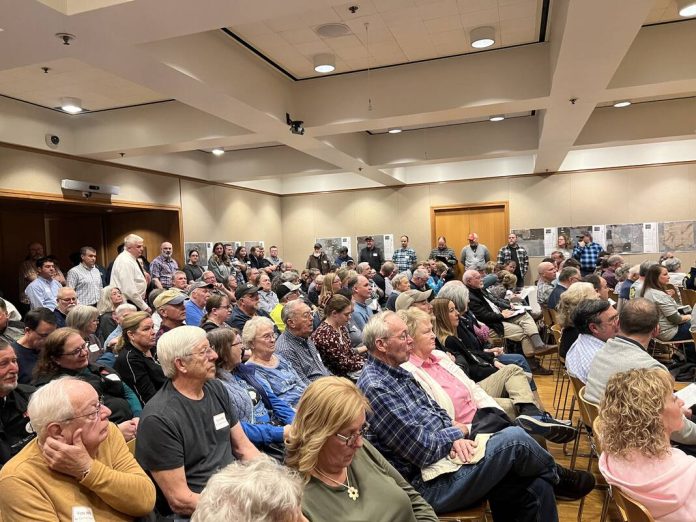
Photo by Brad Davis | The Republic A crowd gathers Monday night to comment about a proposed solar farm facility in Bartholomew County.
The Bartholomew County Board of Zoning Appeals voted to deny a request for a conditional use permit for Carina Solar to allow a commercial solar energy system in the Agriculture Preferred zoning district. The vote was 4-1 against the proposal with Arnold Haskell voting in dissent.
The project includes multiple parcels of land located generally south of County Road 100S, west of County Road 525E, east of South Gladstone Avenue and north of County Road 400S in Columbus Township.
Carina Solar, LLC, a subsidiary of Samsung’s C&T, submitted an application for a conditional use permit to construct, operate and maintain a proposed 100 megawatt AC power generation facility. It would be placed on 48 parcels of scattered cultivated agricultural fields leased to the company by 24 local landowners.
The proposed project would be located on a total of approximately 1,883 acres of leased property from multiple land owners.
Roughly 1,124 acres of the proposed project are located within county jurisdiction and were subject to Monday’s meeting.
The other 795 acres are in city jurisdiction, necessitating a separate conditional use request, according to Columbus/Bartholomew County Planning Director Jeff Bergman. The Columbus Board of Zoning Appeals considered the proposal Tuesday night and coverage of that meeting will be provided at therepublic.com.
According to the site plan, 763 acres of the total 1,883 acres would have solar panels, equating to less than 40 percent of the land. Samsung C&T Director of Land Sean Cavanagh said “the rest (of the land) is going to be either wetlands remaining how they naturally are or continuing to be farmed.”
The request would involve fencing, solar panels, inverters, access drives and connection lines.
“There’s a great kind of crisis going on now in farming, where the older generation is starting to retire and the younger generation unfortunately doesn’t want to be involved in farming as much as they used to 30, 40 years ago, it’s getting harder.”
Cavanagh argued leasing land for commercial solar farms is a way for families to supplement their income.
“I want to reiterate that this is not their farmland that the solar panels are being put on, it’s being put on land that these farmers have chosen to put this project on their land.”
He also repeatedly discussed how the solar fields “are one of the most passive uses of land” even more so than farming.
Public comment during the standing-room only meeting lasted over two hours with the vast majority in attendance speaking against approving the conditional use permit.
Nonprofit Bartholomew County Citizens Concerned about Commercial Solar Fields (B4CSF) had voiced opposition to the project and those similar to it and did so again on Monday night with several representatives giving a presentation detailing why they believed Carina had not met the standards needed for conditional use permits.
The city and county BZA utilize a specific four-point criteria of development standards when making decisions on requests for conditional use approvals.
- The project will not be injurious to the public health, safety and general welfare of the community.
- The development will be consistent with the intent of the development standards established by the Zoning Ordinance for similar uses.
- The conditional use will not be contrary to the general purposes service by the Zoning Ordinance, and will not permanently injure other property or uses in the same zoning district and vicinity.
- The condition use will be consistent with the character of the zoning district in which it is located and the recommendations of the comprehensive plan.
Many said they believed the solar panels would decrease their home values, are not aesthetically pleasing, and could irreparably damage the land itself.
There were contentions made regarding safety. Resident Caitlin Murphy mentioned how adverse weather could damage the panels. Shawn McNealy, a Columbus Fire Department lieutenant, said while fire risk is low at such facilities, Carina mentioned in their application that there is no fire risk. One resident said the facility would encroach on habitat for bald eagles.
Some were concerned about the facility’s close proximity to St. Paul Lutheran Early Childhood ministry and about how the power generated from the facility wouldn’t necessarily benefit Bartholomew County given the nature of how the power grid operates.
There were also similar distinctions made by several people who said they weren’t against solar power, they just didn’t think it should be on Bartholomew County farm land.
“What you will not hear from our group are statements about being against climate change or against solar power,” B4CSF’s Cheryl Carothers said. “However, we are against losing thousands of acres of fertile Bartholomew County farm land into large commercial solar panel wastelands.”
Hope resident Dena Hasler pointed towards goal one of the county comprehensive plan: “Preserve productive farmland and maintain the productive capacity for a strong county agricultural industry.”
“In the county application, Carina constantly refers to these industrial sites as farms. They are not farms, they are not agriculture, in their own words it is a commercial power generation facility,” Hasler said.” … I am not anti solar panel, I am anti solar panel on farm ground.”
Planning department staff’s preliminary staff recommendation was to approve the conditional use permit.
Columbus-resident John Richardson over Webex said that he was confused why people would be protesting solar panels.
“If these protesters care about what is in our atmosphere, then they surely would actually want solar and an emissions free power source that shares it’s space with grass and other plants,” Richardson said. “Whoever has chosen to settle or lease their land for the solar project are not losing money from this, they chose to make their property available for this.”
The county adopted zoning ordinance standards for commercial solar energy systems in November of 2022, which included various requirements on setbacks, equipment height, vegetative ground cover and several other standards.
Haskell made a motion to approve the conditional use permit, with conditions that setbacks for schools be increased to 500 feet and that test results be provided to show any levels of toxicity within the panels.
“I was told that the value of a home in a subdivision is 147 times that of farmland— that tells me that’s an economic driver and I’m just trying to go ahead and 30 years from now, or 40 years from now, and see what will happen as a result of that economic driver.”
Haskell’s motion did not receive a second, meaning the motion died.
Board member Eric Scheidt made the motion to deny the conditional use permit on the grounds of criteria four related to the character of the zoning district and the recommendations of the comprehensive plan.
Scheidt said he does not believe the proposed solar project would preserve productive farmland.
“On number four, we have what seems to me to be a contradiction in the staff’s findings, in that because they have only used 763 acres of the 1883 acres involved in a project that that is somehow preserving farmland,” Scheidt said.




